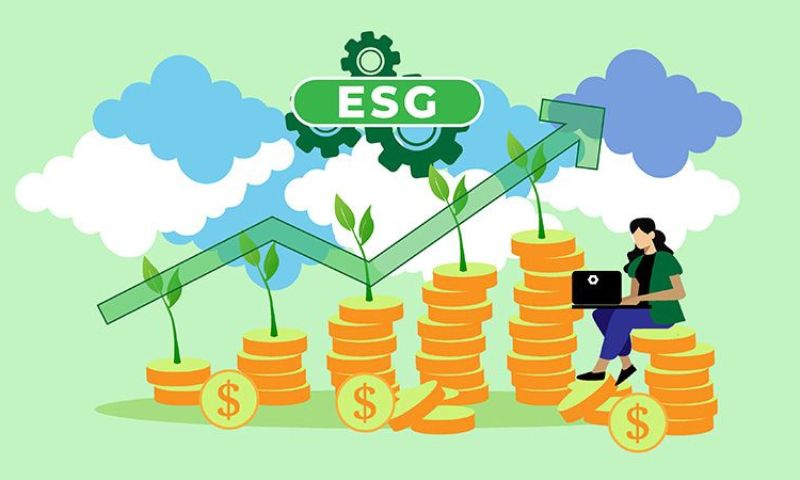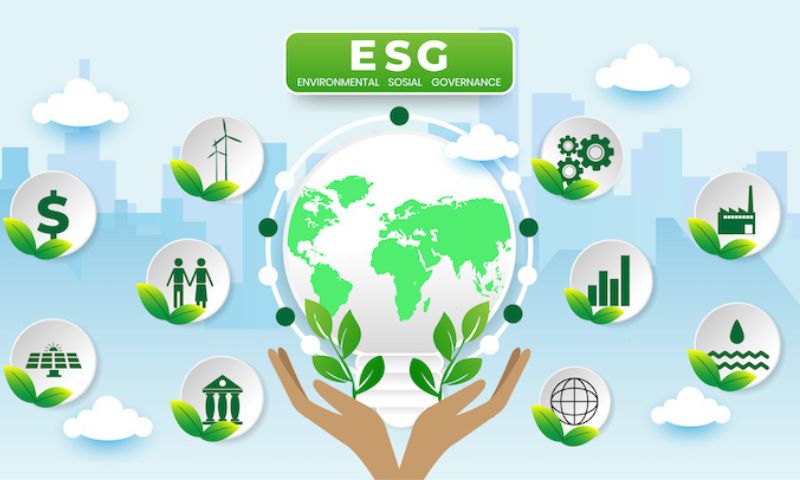Is ESG Investing Right for Me? Unlock the Secrets to Ethical Returns
Money talks, but now it also changes the world. As I help you dive into the world of Ethical, Social, and Governance (ESG) investing, you might be asking, “Is ESG investing right for me?” You want returns, sure, but you also care about where your cash goes and the impact it makes. It’s not just about profit; it’s about principles. Together, we’ll explore how your values can shape your investment choices and maybe lead you to healthier financial growth. Can you really line your pockets and still be the hero? It’s time to find out. Ready to align your wallet with your world? Let’s go!
Assessing Personal Alignment with ESG Principles
Understanding Your Investment Values
Do you care where your money goes? Do you want it to do good? If yes, ESG investing could be for you. ESG stands for Environmental, Social, and Governance. This means you invest in companies that care for our planet, treat people well and are run fairly. For example, a company that cuts down on pollution, pays fair wages, and has honest leaders.
People love ESG investing because it matches their values with their money. Let’s dive in and see how it works!
How ESG Investment Benefits You
Investing is not just about making money. It’s also about making a difference. By choosing ESG, you support clean air, fair jobs, and strong communities. Your money backs companies that do right by the world. And guess what? These companies often do well money-wise too. This is because they plan for the future. They care about more than just today’s profit.
Sustainable Investing
Sustainable investing is for the long game. It looks at the big picture. It asks, “Will this company do well years from now? Are they making the world better?” This matters because the world is changing fast. Companies that ignore this may not last.
Green Investing
Green investing focuses on the environment. It puts money into clean energy like wind and solar. It avoids oil and coal that can harm our world. This helps speed up the switch to clean energy. It also fights climate change, which is a big deal for our planet.
Aligning Values with Investment Choices
Now, let’s talk about how you choose what to invest in. You have to think about what matters most to you. Do you care more about clean air or fair work conditions? Your answer helps pick your investments.
Analyzing ESG Funds
You want to know where your money goes, right? So, you look at ESG scores. These tell you how well a fund meets ESG standards. The higher the score, the better the fund at ESG. You also want to check how well the fund does money-wise compared to other investments.
Ethical Investment Strategies
Ethical strategies choose investments based on right and wrong. They skip over things that harm people or the earth. This could mean no tobacco or guns. It means yes to companies that help, not hurt.
ESG Metrics Evaluation
How do you measure if an investment is good for ESG? There are many ways. You look at things like carbon footprints, how workers are treated, and if the company follows the law. This helps you see the true impact of your investment.
When investing, you want to feel good about where your money is. That’s what ESG is all about. It blends doing good with earning money. It’s not perfect, but what is? The key is that ESG tries to make the future brighter for everyone. Now, are you ready to match your money with your values? ESG might just be your path to ethical returns.

ESG Investment Advantages and Returns
Comparing ESG Returns with Traditional Investments
Think about money and morals. They can mix well. People often ask, do ESG investments keep up with other stocks? Let’s talk numbers. In many cases, yes, ESG investments can go toe to toe with traditional investments. Here’s the deal – doing good can also mean doing well, financially speaking. Studies show ESG funds often match or outdo regular funds.
When you pick stocks or funds, you might look at their history. You’ll do the same for ESG. Do they make money over time? Check ESG ratings and past growth. This helps you know what you might expect. Good ESG scores can mean a company is strong and smart in handling risks. So, your money can grow and do good at the same time.
Long-term Value and Performance of ESG Portfolios
Now, let’s talk about the long haul. ESG investing is not just about quick wins. It’s a marathon, not a sprint. Over time, companies that pay attention to ESG principles might stay strong. They often dodge big problems and keep going when others fall.
When you invest for years, think ESG. Why? Companies that care about ESG often plan ahead. They look far down the road, beyond next quarter’s earnings. These firms can adapt, shift gears, and grow year after year. Your money stays safer and may grow steady and sure.
It’s like planting a tree. First, you care for it, water it and wait. You pick a good spot with room to grow. Then, over years, it stands tall, roots deep, against winds and storms. ESG investing can be like that. Your cash can grow roots in firms that stand strong against trouble.
So, look at ESG funds with a sharp eye. Not all are the same. Find ones that fit your goals and your hopes for the world. Eco-friendly, social good, strong leaders – all these matter in ESG. Measure them with a clear yardstick. ESG scores offer this clear view. They help you see behind company doors.
Think about your kids, or their kids. What kind of world will they live in? Your ESG choice now can shape that future. Money talks. Where you put yours can push companies to do better – for people and the planet.
In the end, ESG investing says something about you. It’s about your values, your vision for the future. It’s not just about the cash you make, but the mark you leave on the world. So, is ESG investing right for you? If you wish for returns that respect the earth and its people, then yes, it might be the perfect match.

The Risks and Realities of ESG Investing
Navigating ESG Investment Risks
Let’s find out what ESG investing can mean for you. Do you want your money to do good in the world? ESG investing might be for you. This way of investing checks companies for their environmental, social, and governance practices. But there’s a catch. Just like any investment, ESG has risks. The first involves researching. Are the ESG funds you pick truly eco-friendly or just pretending? Some funds say they are green but might not be. You have to dig deep and check their history and what they invest in.
Another thing to think about is performance. Some folks worry that ESG might not make as much money as regular investments. Yet, many ESG investments often keep up with or even beat normal stocks. How? Because companies that care about their impact might be better choices for the long haul. They might dodge big scandals or legal troubles tied to bad environmental or social actions. This is what we call analyzing ESG funds. Look at their past, see how they perform, and see if they stay true to their ESG goals.
Also, think of ESG scoring systems. These are like report cards for companies on how well they do with ESG. High scores can mean good things, but not always. Sometimes a high score in one area can hide a low score in another. So, it’s not just about the score. It’s about all parts of ESG.
The Impact of ESG Controversies on Investments
Now, what happens when a company you invest in faces an ESG controversy? It can hurt the company’s stock price and how the public sees them. Imagine a company that has a good score for caring about the earth but then causes a big pollution event. This can make investors lose trust and could drop the value of your ESG investment. It’s called ESG impact measuring. How do these events change what investors think and do?
To wrap up, investing in ESG means you want to back up good deeds with your dollars. But it’s not as easy as picking any green fund. It’s about smart, careful choices. We’re talking deep research to avoid fake green claims, understanding the real performance of ESG compared to usual investments, and knowing that high ESG scores should lead to real, good actions.
Be sharp. Think about what each company is really doing for the environment, society, and their own house rules. That is the heart of ESG portfolio management. It’s all about using your money to push for a better world, while also keeping an eye on the important goal – making sure your investment grows over time.
ESG investing is not just a money move. It’s a stand. It’s your shout to the world that values matter in business. But like any shout, make sure it’s clear, thought out, and truly heard. That’s how you use ESG to help our world and your wallet.

Implementing an ESG Investment Strategy
Approaches to Integrate ESG Criteria in Portfolio Management
You’re ready to invest, but you want to do good while earning money. Here’s how. Start simple. Pick ESG funds that match your values. ESG means caring for the Earth, its people, and how companies are run. Think green energy or fair worker pay. It’s about mixing profit with doing what’s right.
Investing this way means looking at ESG scores. Higher scores usually mean better company behavior. But remember, you still want to make money. So, find a balance. Look for funds that score well and have solid returns. ESG investing can be smart money moves. It’s like investing with your head and heart together.
Each company in a fund gets checked. They’re graded on how they treat the planet and people. Funds with high marks in ESG criteria are picked for your portfolio. They stand for clean air, clean water, and respect for all. Building a portfolio this way is a craft. It blends ethics and earnings.
Leveraging ESG Scores and Reporting in Investment Decisions
Now, let’s talk numbers. ESG scores help you choose. They come from data and deep research. They tell us how well a company does with its ESG duties. Companies share how they’re doing. They report on stuff like carbon footprints and worker happiness.
Use ESG scores to guide you. They can push companies to do better. And when companies do better, often, so do your investments. ESG investing aims for wins all around – for the Earth, its people, and your wallet.
It’s not just about picking stocks with high ESG scores, though. A good strategy involves knowing the risks, too. Sometimes, things go wrong. You might hear about an oil spill or unfair work conditions. These ESG risks can hurt a company’s score and maybe your investment.
So, be smart and stay on top of the news. And talk to experts. They know the drill. They can help you spot the best ESG funds and dodge the risks. Adding ESG to your investment decisions is a powerful move. It shows you care enough to invest in our planet’s future. And it can pay off too.
Remember, doing good with your investments is possible. With ESG, you’re part of a bigger picture. It’s not just about the cash. It’s a way to help shape a better world. Investing with purpose can be your way of saying, “I’m in for a brighter future.”
In this journey, we’re walking the talk of responsible investing. By carefully analyzing ESG funds and tapping into ESG scores, you’re not just riding the wave. You’re making waves of positive change, one investment at a time. It’s the smart thing to do, and it feels good, too.
Let’s wrap this up. We looked at matching our investment choices with what we care about, like the environment, social values, and good company leadership, which we call ESG principles. We saw how ESG investments can compete with regular ones and might even do better in the long run. Sure, there are risks and you’ll face some tough questions, but that’s with any investment.
We also covered how to weave ESG into your investment plan. Remember, using ESG scores helps make smarter picks. The bottom line? Investing with ESG in mind isn’t just good for the world; it can be smart for your wallet, too. Trust yourself and remember these tips when you’re making your next investment move.
Q&A :
What is ESG Investing?
ESG investing refers to an investment strategy that emphasizes a company’s operations in three specific areas: environmental, social, and governance. Investors who apply ESG criteria are looking to invest in companies that are not only financially sound but also have positive values and impacts in these non-financial aspects.
How does ESG Investing work?
To practice ESG investing, investors evaluate companies based on their adherence to certain environmental, social, and governance principles. This process typically involves researching and scoring companies on a range of ESG factors, such as their energy use, waste, pollution, natural resource conservation, treatment of animals, labor relations, diversity practices, and management structure.
Who should consider ESG Investing?
Individuals who want to make sure their money is going towards businesses that align with their ethical values may find ESG investing appropriate. This includes investors who are concerned about global issues such as climate change, human rights, corporate accountability, and transparency. ESG investing can be suitable for both personal and institutional investors.
Are there financial benefits to ESG Investing?
Many studies suggest that companies with strong ESG practices may offer better long-term financial performance due to efficient operations, lower risks, and better responsiveness to regulatory changes. However, as with any investment, there can be no guarantee of returns, and ESG investments should be evaluated alongside other financial metrics.
How do I start with ESG Investing?
Starting with ESG investing typically involves doing some research or working with a financial advisor familiar with sustainable investing practices. You can look for ESG mutual funds, index funds, or exchange-traded funds (ETFs) as a way to include ESG-focused investments in your portfolio. Additionally, reviewing fund prospectuses and investment company sustainability reports can provide insight into their ESG strategies.




